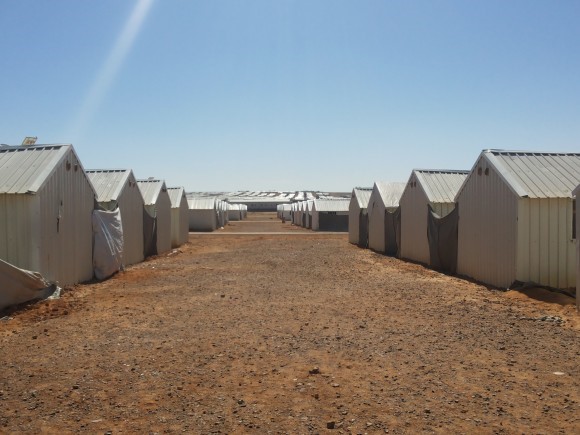
Shelters in Azraq are not currently connected to a greywater network, meaning greywater and mud tends to accumulate in the ditches surrounding the shelters
In September 2017, ACTED Jordan, with funding from UNOCHA, UNICEF and GIZ, began two new projects in Azraq refugee camp: the first, the construction of plot-level grey water networks, and the second, providing income generating opportunities within the camp contributing to camp cleaning and sustainable waste management practices.
Azraq camp is currently home to 53,000 Syrian refugees. They have been living in the camp for over three years, during which time it has become evident that there is a critical need for the improvement of water, sanitation and hygiene (WASH) infrastructure and provision of adequate services. A gradual improvement of basic service provision has been taking place (electrification, expansion of education services, etc.), with the notable exception of household-level WASH facilities that have remained the same ever since the camp was established.
Constructing a new greywater network
Azraq camp is built on a large natural depression which makes it prone to flooding in winter, and to odorful and insect-attracting stagnating water in the ditches. As refugees wash their hands or do their dishes in their caravans, grey water accumulates in the ditches around their shelters. In order to address the issue of stagnant grey water and the associated public health risks, ACTED is starting the construction of a grey water network in Village 3 of Azraq refugee camp with funding from UN OCHA and UNICEF. In this sense, ACTED is providing short-term job opportunities, trainings and tools to 240 Syrian refugees in Azraq to construct the greywater network.
Waste to positive energy
As work opportunities are limited for refugees who live in camps, in order to higher increase the number of income generating opportunities while contributing to the improvement of sustainable waste management practices in the camp, ACTED is implementing a project called ‘Waste to positive energy’ with funding from GIZ. The aim is to improve the quality of life of Syrian refugees in the camp and to reduce the adverse impact of solid waste on the environment by encouraging desegregation of waste at the household level, promoting the recycling of waste and providing 997 job opportunities for camp cleaning activities.